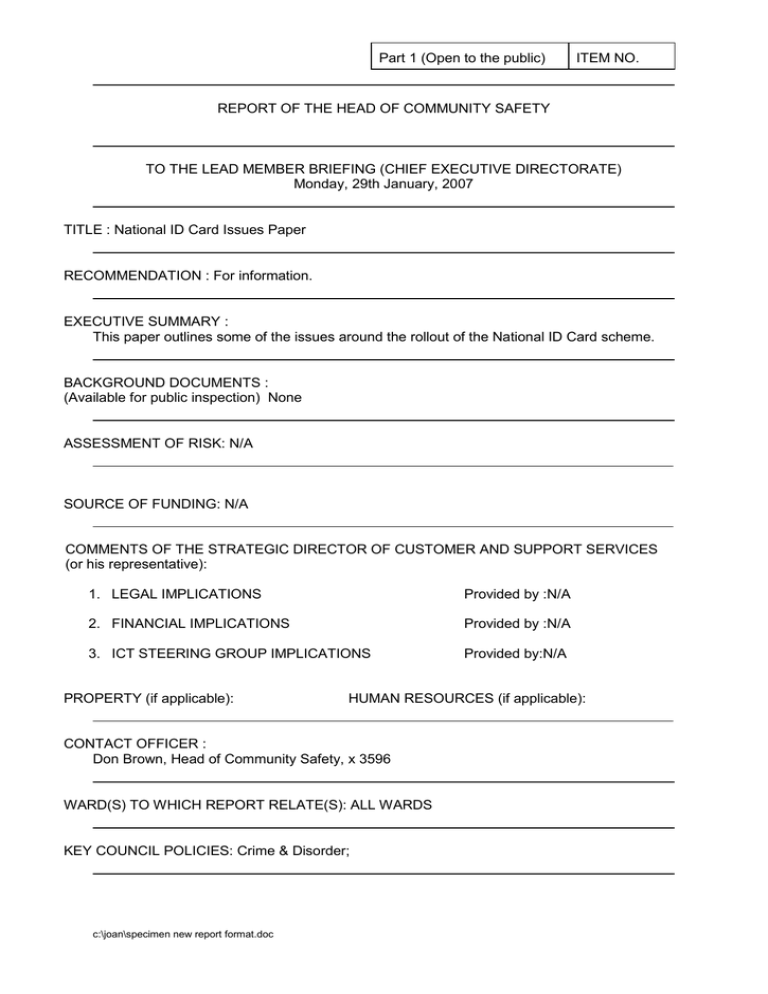Part 1 (Open to the public) ITEM NO.
advertisement

Part 1 (Open to the public) ITEM NO. REPORT OF THE HEAD OF COMMUNITY SAFETY TO THE LEAD MEMBER BRIEFING (CHIEF EXECUTIVE DIRECTORATE) Monday, 29th January, 2007 TITLE : National ID Card Issues Paper RECOMMENDATION : For information. EXECUTIVE SUMMARY : This paper outlines some of the issues around the rollout of the National ID Card scheme. BACKGROUND DOCUMENTS : (Available for public inspection) None ASSESSMENT OF RISK: N/A SOURCE OF FUNDING: N/A COMMENTS OF THE STRATEGIC DIRECTOR OF CUSTOMER AND SUPPORT SERVICES (or his representative): 1. LEGAL IMPLICATIONS Provided by :N/A 2. FINANCIAL IMPLICATIONS Provided by :N/A 3. ICT STEERING GROUP IMPLICATIONS Provided by:N/A PROPERTY (if applicable): HUMAN RESOURCES (if applicable): CONTACT OFFICER : Don Brown, Head of Community Safety, x 3596 WARD(S) TO WHICH REPORT RELATE(S): ALL WARDS KEY COUNCIL POLICIES: Crime & Disorder; c:\joan\specimen new report format.doc DETAILS The Identity Cards Act 2006 received Royal Assent on 30th March 2006. The Act provides the legal framework required to establish a National Identity Register, and to issue ID cards to those on the Register. Its main features are: Setting out the statutory purposes of the National Identity Register and setting up the National Identity Register Establishing powers to issue ID cards Establishing powers to designate documents as ID cards or as documents to be issued alongside (e.g. passports) Setting out what information may be held and establishing safeguards to protect individuals’ data Enabling public and private organisations to verify a person’s identity with the person’s consent before providing services Defining the circumstances where certain public authorities (such as the police) could be provided with information without an individual’s consent Providing for a National Identity Scheme Commissioner to have oversight of the scheme and to report to the Secretary of State/Parliament Creating new criminal offences relating to misuse of ID cards and other identity fraud issues Prepares for powers to link future access to specified public services to production of and ID card and/or a check on the Register Rollout: From 2008: Foreign Nationals from outside the European Economic Area (EEA) applying for visas to come to the UK will have to register and submit biometric information such as fingerprints and iris scans Everyone over the age of 16 applying for a passport will have their details added to the National Identity Register In addition, the Home Secretary has recently announced that they are looking at ways to register all non-Europeans already in the UK Until 2010 anyone renewing or getting a passport will be able to opt out of having an ID card From 2009: The first ID cards will be issued From 2010: The Identity and Passport Service will issue “significant volumes” of compulsory ID cards alongside passports It is clear that it will be some years before all adults will hold an ID card. The Government talks about this being a long-term programme with an incremental implementation approach to allow for contingency plans. From 2010, all passport applicants will be issued with ID cards. The current legislation does not make it compulsory for all adults to have an ID card but the Labour Government has said that if they win the next election they will bring forward legislation to make them compulsory for all UK citizens over the age of 16 whether they have a passport or not. The Conservatives and Liberal Democrats oppose the plans. It will not be compulsory to carry the card with you at all times. c:\joan\specimen new report format.doc What information will/will not be stored on the card? Some 50 items of information have been identified that could be held on the ID card. These include name/date of birth/address; photograph, fingerprints and other biometric information; residential status; personal id numbers e.g. National Insurance number, work permit number etc.; registration and ID card history information (e.g. notifications of lost, stolen or damaged ID cards); validation and security information such as requests for modification of personal information. The government has said that they will not store information about someone’s race, religion, sexuality, health, criminal record or political beliefs. Costs of the scheme: National costs The Government has recently laid before Parliament a document that outlines the national costs of this scheme (Identity Cards Act 2006 – First Section 37 Report to Parliament about the likely cost of the ID cards Scheme, Home Office, October 2006): Total resource costs of providing passports and ID cards to British and Irish citizens resident in the UK for October 2006 to October 2016 Cost area Set up Operational Total Cost for British and Irish citizens resident in the UK £290 million £5,100 million £5.4 billion However, The London School of Economics (LSE) has established a group of academics called The Identity Project. They scrutinise the National Identity Card Scheme. Their estimates of how much the scheme will cost the UK are: Best case scenario £10.6 billion Worst case scenario £19.2 billion Costs to the individual The Government estimates that the new combined passport and ID card will cost £93 to produce, but the fees people will have to pay in practice have not been set. The LSE Identity Project estimates that the costs will be, best case £170 per card and passport, worst case £320. Costs to other organisations such as local authorities The Government report on cost estimates excludes costs falling to other organisations. It says “The decision to use ID cards is for each organisation, hence these costs are outside the scope of this report”. Clearly there will be costs associated with purchasing card reading equipment and training costs for staff should organisations choose to use the cards as means of identity and access to services. c:\joan\specimen new report format.doc Implications for local government and other public services: In Salford, it would be fair to consider that the majority of adults hold passports, but it is difficult to calculate what percentage of the population will hold an ID card in 2010. Government figures state that around 8% of UK adults receive a passport each year. The Government goal is to achieve 80% of adults holding cards by 2013. What is the case is that unless ID cards are made compulsory in the next parliament, local authorities cannot rely on them being the sole mechanism for identification of individuals and their entitlement to services. As stated above, there will be cost implications around the purchasing of card reading equipment and training of staff if we do make use of the ID card. One thing for the local authority to consider is that every person getting a biometric ID card will need to visit a Passport Office in person. Government acknowledges that currently the Passport Service (IPS) does not have the capacity or infrastructure to enable this to happen. The Strategic Action Plan for the National Identity Scheme says that they are to open “69 new local offices to meet and interview first-time applicants for passports, and to prepare for recording biometrics. These offices will be open in 2007 and will be used for the National Identity Scheme. Where the network of enrolment centres needs to be further expanded, we will first seek to use high street offices that are already used by central and local government.” With these current plans there could be issues of accessibility for Salford citizens and we may need to consider in the future having such an office integrated into the Civic Centre complex or other suitable location. It is not clear if there would be any income generation opportunities of leasing space to the IPS. Nor have possible security issues been discussed. With regards to the benefits of local authorities making use of the ID card scheme in their business, one of the Government's stated purpose of the card is to prevent identity theft and fraudulent use of public services (e.g. Benefits fraud). Critics of the scheme, however, point out that only 2.5% of fraudulent claims are about false identity, with the vast majority of fraudulent claims being about circumstances e.g. work status. An issue of concern to the local authority is that the Government’s financial report says that one of the benefits of the scheme is that the information held on the National Identity Register would provide the basis for more accurate statistical analysis and policy making, and that by creating a standard population register this would remove the need for a full census and save the costs of running a census (£207 million in 2001). For the local authority and other public bodies, the demographic information available through the census is crucial to strategic planning. With regard to the Police Service, the Police Federation officially supports the scheme because ID cards can establish identity. Researchers say that police privately would prefer that the money to be spent on this scheme was used to increase the number of police officers on the streets. Another argument says that the problem is more one of catching and convicting criminals than identifying suspects. Other biometric systems During the research for this briefing note, I came across a scheme being rolled out in Somerset and funded through the Safer, Stronger Communities Fund. For your information, this scheme uses a bespoke database package that records fingerprints and photos of patrons of licensed premises. The database allows pub and bar licensees to add information about the behaviour of their patrons and this information is shared around pubs that are signed up to the scheme. c:\joan\specimen new report format.doc Another scheme is a trial of handheld fingerprint readers that are being tested in ten areas around the country. The readers are held by traffic police who can scan a motorist’s fingerprints and compare them to records held on the national database using encrypted wireless transmission. Apparently, 60% of drivers currently stopped do not give their real identity. It is not compulsory for drivers stopped to give their fingerprints and civil liberties groups are against the scheme. Background Documents: Her Majesty’s Stationary Office, Explanatory Notes to Identity Cards Act 2006 The Identity Project: an assessment of the UK Identity Cards Bill and its implications, Local Government Information Unit (LGUI), June 2005 BBC News – various reports Home Office web information pages Strategic Action Plan for the National Identity Scheme: Safeguarding your identity, Home Office, December 2006 Identity Cards Act 2006 – First Section 37 Report to Parliament about the likely cost of the ID cards Scheme, Home Office, October 2006 The London School of Economics Identity Project – various publications RMB 11/01/07 c:\joan\specimen new report format.doc





